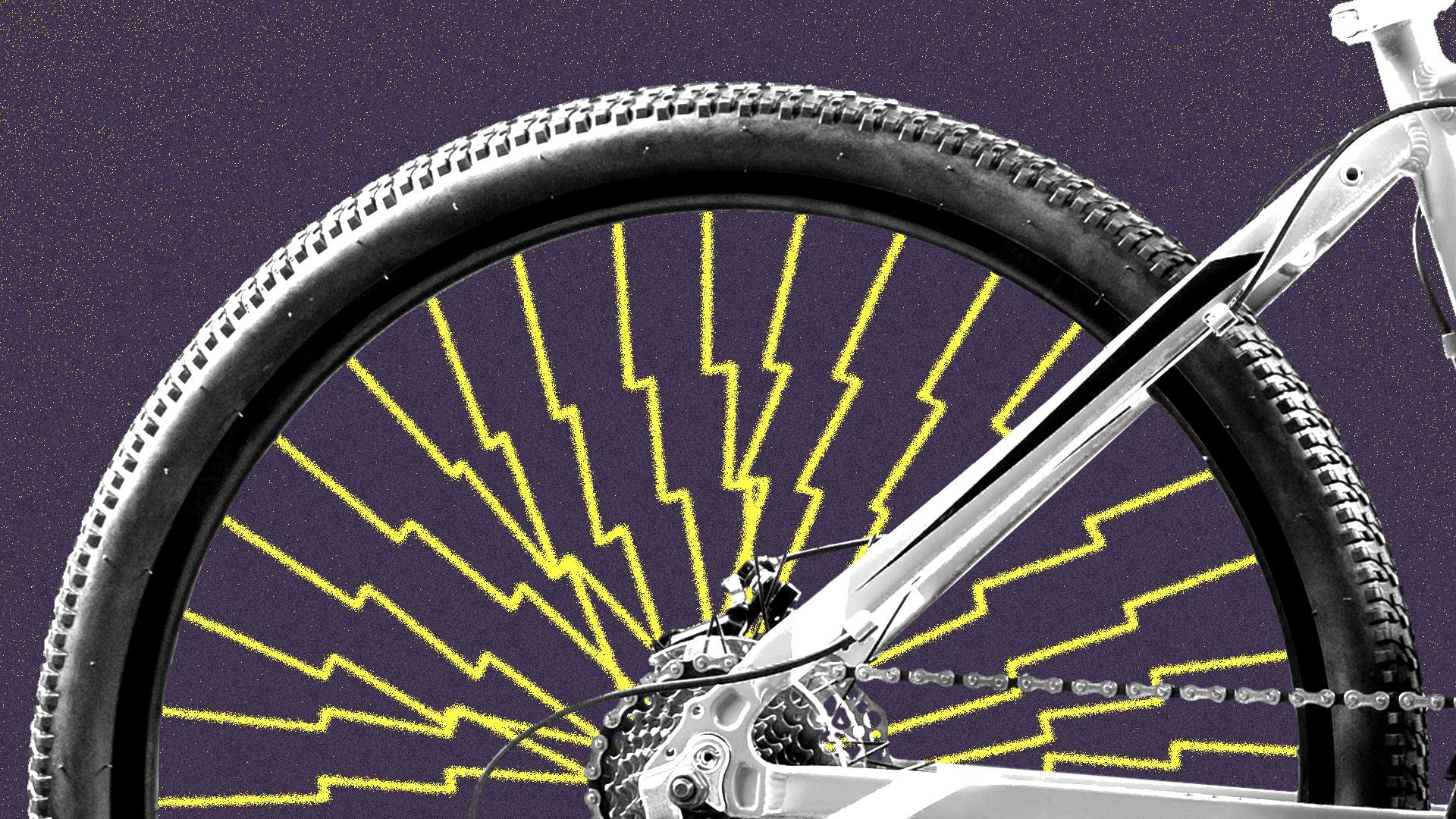| | | | | | | Presented By Barclays | | | | Axios Markets | | By Felix Salmon · Jan 07, 2023 | | Happy new year! I hope it's a prosperous one for you. - In this week's newsletter: Fixing retirement; Musk schadenfreude; e-bikes; and more. All in 1,310 words, a 5-minute read.
| | | | | | 1 big thing: Saving savings |  | | | Illustration: Sarah Grillo/Axios | | | | If you're the kind of person who maxes out your 401(k), you're saving an extra $2,000 a year of pre-tax money this year, compared to 2022. That's the largest increase ever, not only in dollar terms but even in percentage terms. Why it matters: The kind of people who max out their 401(k) are not the people who most need a government incentive to save for retirement — they'd most likely be doing that anyway. - Workers in the gig economy, by contrast, simultaneously are more in need of retirement security and have almost no access to government-funded tools for building it.
Driving the news: The inflation-driven increase in 401(k) contributions is far from the only good news for well-heeled savers and the financial-services firms that manage their money. The omnibus act passed at the end of December included other key provisions, including: - Retirees can now wait until they're 73 before they need to start withdrawing money from their 401(k) fund; in 2019, that age was 70½. By 2033, it'll be 75.
- Many 401(k) plans will become opt-out, rather than opt-in, nudging workers to save more for retirement.
- Workers over 50 can make pre-tax catch-up contributions of $7,500 a year to their 401(k) — over and above the normal $22,500 maximum. In 2025, that number rises to $11,250 for workers over 60.
By the numbers: These changes will only increase the degree to which retirement tax expenditures are targeted at the rich. Even before they came into law, 87% of retirement tax benefits went to the top 40% of taxpayers. The big picture: For retirement security to make its way to the 33% of Americans who have no access to retirement plans at all, something more ambitious is needed — something like the Retirement Savings for Americans Act proposed by members of Congress in both houses and from both parties. - The bill effectively copies the idea I wrote about in March 2021, of automatically enrolling lower-paid American workers into the government's excellent Thrift Savings Plan.
- It includes a tax credit that effectively acts as a government 401(k) match that can double contributions up to 5% of income.
- The contributions phase out once workers start earning more than 150% of the median wage, or 200% for joint filers.
- Because the savings plan is operated by the government, workers can switch from job to job as much as they like, or even have multiple jobs at once, all contributing to a single plan.
The bottom line: Congress has done a good job of boosting the retirement accounts of rich Americans. Poor Americans, however, remain left behind. |     | | | | | | 2. The Elon Musk personality cult lives strong |  | | | Photo illustration: Shoshana Gordon/Axios. Photo: Christian Marquardt - Pool/Getty Images | | | | Elon Musk is doing just fine. His stakes in SpaceX, Tesla, and other concerns have made him the second-richest man in the world. He owns a global social network of awesome power. He's procreating zealously. - He isn't going to colonize Mars, but he wants to, and his chances of doing so, while tiny, are nevertheless higher than those of any other human in history. Similarly, his chances of being known by name to humans in 500 years' time are higher than those of just about anybody else on the planet.
Why it matters: Musk attained his current mesospheric heights in large part by leaning into a Great Man narrative that credited him not only with all of his past successes but also numerous wildly optimistic future ones. - That narrative, naturally, annoyed a lot of people who didn't much like Musk, or the narrative he was leaning into.
- Those people have been positively gleeful for the past few months, as Musk was forced to buy Twitter, where ever-mounting chaos, combined with problems at Tesla, resulted in $200 billion being wiped off Musk's net worth.
Be smart: The smell emanating from the headlines this week has a name: Schadenfreude. Both Elon Musk and beleaguered would-be House speaker Kevin McCarthy accumulated enemies while gaining power. Those enemies are now thoroughly enjoying their precipitous decline in stature. Between the lines: In the case of Musk, however, the decline of Tesla stock — and thereby of his net worth — is, truth be told, not quite as exceptional as the haters might wish, and certainly isn't some kind of once-in-a-century occurrence. - Tesla is down 73% from its high — more or less in line with Meta (fka Facebook), which is down 67%. It's significantly outperforming stocks like Zoom, which is down 89%, or Beyond Meat, which is down 95%.
- Meanwhile, Musk's other big company, SpaceX, is holding firm to its valuation of around $140 billion.
- In terms of valuation, Tesla is still trading at 34 times earnings, while Meta's P/E ratio is a mere 12. The number for Tesla's strongest competitor, Ford, is barely over 5.
The big picture: The Elon Musk personality cult lives on in Tesla's $350 billion valuation, which is broadly understood to be vastly too high by anybody who doesn't attribute a massive Musk premium to the company. The bottom line: If Tesla's valuation at the end of 2021 made any logical sense, then the company's current valuation would represent a true humbling of Elon Musk. But it didn't, and it doesn't. |     | | | | | | Bonus: Tesla vs. Bitcoin |  Data: YCharts; Chart: Rahul Mukherjee/Axios Bitcoin managed to reach a $1 trillion valuation before Tesla did, but also crashed before Tesla did. - The car company is still worth more than the cryptocurrency, even before accounting for the millions of coins that have been lost over time.
|     | | | | | | A message from Barclays | | Will the Fed crash the U.S. into recession in 2023? | | |  | | | | As the U.S. economy slows, all signs point toward a recession this year. Is it a necessary implication for the Fed or a policy mistake? What you need to know: Catch the debate to get our analysts' outlook on the U.S. economy for 2023 with the Flip Side podcast. Listen now. | | | | | | 3. The best place to subsidize electric vehicles |  | | | Illustration: Brendan Lynch/Axios | | | | Imagine an electric vehicle. You're probably thinking of something that's fun to drive. That kind of EV is also dangerous, and, especially when it's an SUV, not particularly environmentally friendly. Why it matters: There's a much better alternative staring us in the face: Electric bikes. But they're too expensive, and that itself is dangerous. Subsidizing them will make them safer. The big picture: Electric cars are bigger, heavier, and faster than their internal-combustion predecessors; they also tend to be festooned with distracting screens. That makes them very dangerous to other road users. Electric SUVs have batteries so huge that they may actually end up increasing carbon emissions overall. Between the lines: People have a revealed preference for electric bikes over electric cars already. The number of e-bikes sold in the U.S. is more than double the number of e-cars, while in China there are more e-bikes than all cars combined. The catch: E-bikes are expensive, which makes it attractive to cobble together cheaper DIY retrofits. The problem is that their batteries can catch fire while being recharged, causing deadly blazes. The solution: By subsidizing safe brand-new e-bikes, cities — or even states, or the federal government — can encourage their populations not to try to order bike-conversion kits from Alibaba. What they're saying: "We subsidize the purchase of electric cars, we subsidize roads, we subsidize gasoline, we subsidize parking, we have even created regulatory loopholes which is why every vehicle on the road now is an SUV," writes Micromobility's James Gross. - "Now imagine if we provided the same boost to an emergent transportation technology that has the power to build a more sustainable future and create more livable cities."
The bottom line: E-bikes are just as much fun as e-cars. And they're vastly better for you and for the planet. |     | | |  | | | | If you like this newsletter, your friends may, too! Refer your friends and get free Axios swag when they sign up. | | | | | | | | 4. Building of the week: Memorial Ecumenical Cemetery, Santos |  | | | Photo: Ricardo Moreira/Getty Images | | | | The Memorial Necrópole Ecumênica, the world's tallest cemetery, is located in Santos, Brazil, site of many of Pelé's greatest triumphs — and also now his final resting place. - Architect Antonio Augusto built a 14-story "vertical cemetery," featuring a 24-hour restaurant, a chapel, an automobile museum, a small fish pond and an aviary.
- The mausoleum for Pelé and his family — as well as Coutinho, his Santos teammate — is about 2,000 square feet, and is on the second floor.
|     | | | | | | A message from Barclays | | Will the Fed crash the U.S. into recession in 2023? | | |  | | | | As the U.S. economy slows, all signs point toward a recession this year. Is it a necessary implication for the Fed or a policy mistake? What you need to know: Catch the debate to get our analysts' outlook on the U.S. economy for 2023 with the Flip Side podcast. Listen now. | | | | Many thanks to Kate Marino for editing this newsletter, and to Elizabeth Black for copy-editing it. |  | | Why stop here? Let's go Pro. | | | | | | Axios thanks our partners for supporting our newsletters.
Sponsorship has no influence on editorial content. Axios, 3100 Clarendon Blvd, Arlington VA 22201 | | | You received this email because you signed up for newsletters from Axios.
To stop receiving this newsletter, unsubscribe or manage your email preferences. | | | Was this email forwarded to you?
Sign up now to get Axios in your inbox. | | | | Follow Axios on social media:    | | | | | |












No comments:
Post a Comment